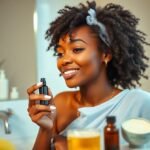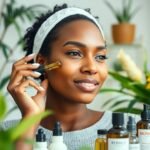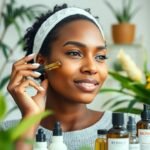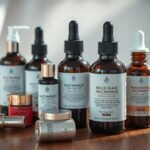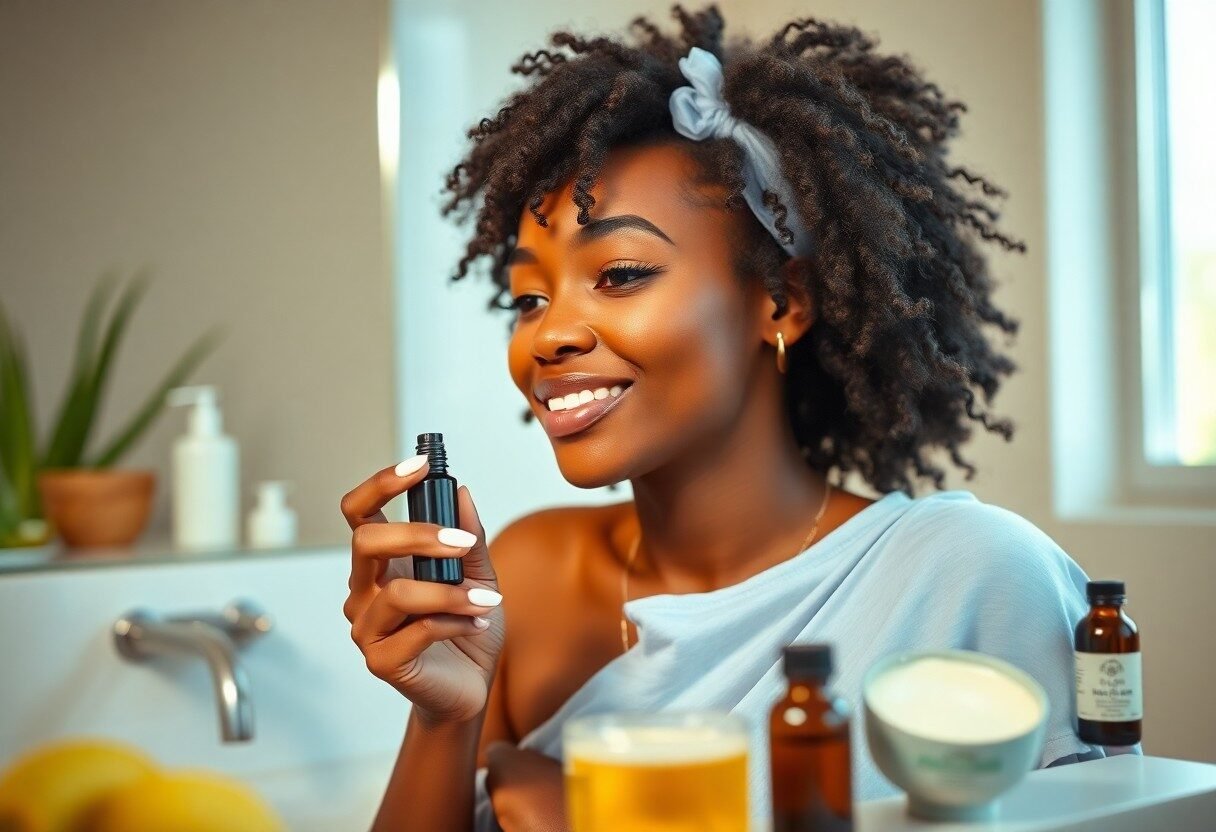
Skincare is necessary for maintaining healthy, radiant skin, especially for African American women who often face unique challenges such as hyperpigmentation and dryness. By choosing natural and organic skincare products, you can avoid harmful chemicals that can exacerbate these issues. I’ve found that these products not only nourish the skin but also promote overall well-being by utilizing plant-based ingredients rich in vitamins and antioxidants. Embracing organic options allows you to enhance your beauty regimen while prioritizing your skin’s health and the environment.
Key Takeaways:
- Natural and organic skincare products often contain fewer synthetic ingredients, reducing the risk of irritation and allergies, which can be beneficial for sensitive skin types common among African American women.
- These products typically include plant-based ingredients that provide nourishing benefits, such as vitamins, antioxidants, and imperative fatty acids, promoting healthy skin.
- Many natural formulations target hyperpigmentation, a common skin concern for African American women, using ingredients like turmeric and licorice root for brighter, more even skin tone.
- Organic skincare products are often free from harmful chemicals like parabens and sulfates, aligning with a growing trend towards cleaner and safer beauty choices.
- Using natural products can support sustainable practices, benefiting both the environment and communities involved in the sourcing of organic ingredients.
- There is a growing availability of niche brands specifically catering to the needs of African American women, providing tailored solutions that enhance skin health and beauty.
- Transitioning to natural and organic skincare can foster a holistic approach to wellness, encouraging mindful habits that extend beyond skincare routines.
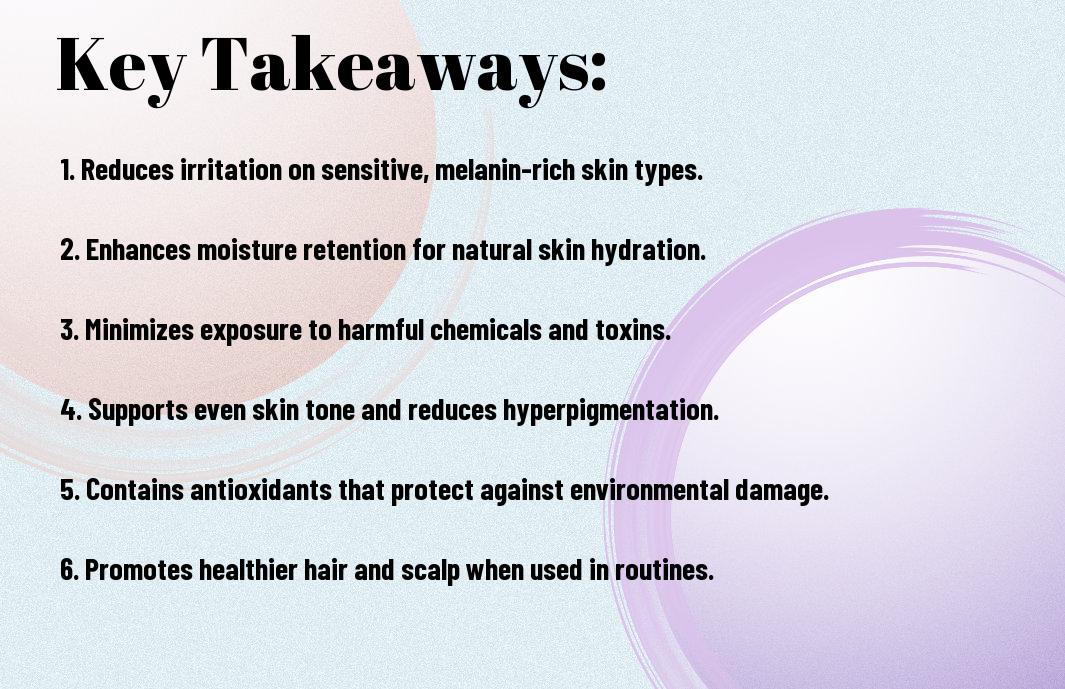
Embracing Natural Ingredients: The Key to Radiant Skin
Choosing skincare products infused with natural ingredients can lead to a noticeable improvement in your skin’s appearance and health. By incorporating plant-based elements, you can achieve a vibrant glow while minimizing the risk of irritation and allergic reactions. Natural ingredients are often rich in vitamins, antioxidants, and necessary oils that nurture the skin, making them an ideal choice for your daily routine.
The Impact of Harsh Chemicals on Skin Health
Harsh chemicals, commonly found in conventional skincare products, can wreak havoc on your skin. Ingredients like sulfates, parabens, and synthetic fragrances can lead to dryness, irritation, and even breakouts. This negative impact is particularly detrimental for melanin-rich skin, which is more susceptible to discoloration and sensitivity. Using products laden with chemicals can exacerbate these issues, leaving your skin less luminous and more reactive.
Nature’s Solutions: Herbs and Oils Tailored for Melanin-Rich Skin
Embracing herbal remedies and natural oils can provide immense benefits tailored to the needs of melanin-rich skin. Ingredients like jojoba oil, rich in fatty acids, serve as an excellent moisturizer, while aloe vera soothes irritation and promotes healing. Shea butter not only hydrates but also offers protection against environmental stressors. Incorporating these elements into your skincare routine can help achieve balance, hydration, and overall skin health.
Herbs and oils, such as rosehip oil and green tea extract, are key allies for melanin-rich skin, providing restorative and protective properties. Rosehip oil is revered for its ability to combat hyperpigmentation and promote an even skin tone, making it a favorite among many. Green tea extract’s anti-inflammatory capabilities help soothe redness and rejuvenate your complexion, encouraging a clear and healthy appearance. By integrating these natural solutions, I’ve witnessed a transformation in my skin’s clarity and radiance, affirming their effectiveness for our unique needs.
Culturally Inspired Formulations: Connecting Traditions to Modern Skincare
Combining age-old traditions with modern skincare science enhances product effectiveness, particularly for African American women. This fusion of cultures creates formulations that honor my heritage while addressing contemporary skincare needs. The integration of traditional ingredients supports a holistic approach, ensuring my skincare regimen resonates with both my personal identity and current advancements in skincare research.
The Role of African Botanicals in Skincare Regimens
African botanicals like baobab oil, marula oil, and sheer butter boast incredible moisturizing and healing properties, making them imperative in my skincare routine. Rich in vitamins and antioxidants, these ingredients help combat dryness and promote an even skin tone, addressing common concerns for women of color. Using products that harness these botanicals can profoundly improve your overall skin health.
Traditional Practices Reimagined for Contemporary Use
Ancient practices, such as using shea butter for skin hydration or honey for its antimicrobial properties, are being confidently reimagined within modern formulations. Brands are now incorporating these traditions with updated techniques, ensuring the preservation of beneficial properties while enhancing usability. For instance, using whipped shea butter in creams provides a light yet rich texture that applies smoothly without greasiness.
This modern take not only respects the heritage behind these practices but also resonates with my busy lifestyle. For example, natural facial oils that blend traditional ingredients with innovative science allow me to achieve unmatched hydration without the need for multiple products. Meanwhile, herbal infusions can offer soothing solutions for a range of skin types, adapting to my unique needs while retaining that authentic touch of tradition. Embracing these updated methods helps me feel proud of my roots while enjoying effective skincare solutions that cater to the demands of today’s world.

Sensitivity and Customization: Why One Size Doesn’t Fit All
Customized skincare routines are necessary, especially for African American women, as our skin often exhibits unique sensitivities and responses to various ingredients. Off-the-shelf products may not cater to your specific needs, resulting in irritation or ineffective treatment. By selecting natural and organic options, you have the flexibility to create a regimen that respects your skin’s individuality, allowing you to target specific concerns and embrace the beauty of diversity in skin care.
Addressing Skin Conditions Commonly Experienced by African American Women
Many African American women face common skin conditions like hyperpigmentation, eczema, and keloids. Natural ingredients such as shea butter, aloe vera, and vitamin C can help address these issues effectively. For instance, shea butter is renowned for its deep moisturization capabilities, which are especially beneficial for maintaining skin elasticity and tackling dryness, while vitamin C works to brighten dark spots and promote an even skin tone.
Personalizing Skincare for Unique Complexion Needs
Understanding that each person’s skin is unique allows you to tailor your skincare to match your complexion’s needs. This customization can include selecting products with specific natural ingredients based on your skin type—be it oily, dry, or combination. For example, incorporating tea tree oil can help manage acne-prone skin, while a nourishing blend of oils may support dry, sensitive skin. Finding a balance that complements your inherent beauty allows your skin to shine while addressing specific issues effectively.
For numerous African American women, the journey to skincare personalization begins with identifying the specific concerns that affect their skin type. Conducting patch tests and seeking recommendations from skincare professionals specializing in ethnic skin can significantly enhance your search for suitable products. Embracing an experimental approach while maintaining a focus on natural ingredients ensures you’re not only addressing current needs but also laying a foundation for long-term skin health. By investing in a personalized regimen, you empower yourself to unlock the true potential of your complexion.
Beyond Skin Deep: The Ethical and Environmental Considerations
Choosing natural and organic skincare products does more than just benefit your skin; it reflects a commitment to ethical and environmental sustainability. Many commercial brands utilize harsh chemicals and exploitative practices that not only harm the planet but also disproportionately affect marginalized communities. By opting for organic products, you’re advocating for a healthier planet and a more equitable beauty industry.
The Sustainability Argument: Advocating for Eco-Friendly Products
Eco-friendly skincare products prioritize sustainability by utilizing ingredients that are responsibly sourced and biodegradable. Brands that focus on sustainable practices aim to minimize waste and reduce their carbon footprint, which is imperative in combating climate change. Packaging made from recycled materials and refillable options further contribute to a greener future, making it possible to indulge in beauty without compromising the health of our planet.
The Social Responsibility of Supporting Black-Owned Brands
Supporting Black-owned skincare brands not only empowers entrepreneurs but also helps enhance representation in the beauty industry. By purchasing from these brands, you contribute to the building of wealth and opportunities for Black communities, promoting financial independence and inspiring future generations. Every dollar spent is a step toward fostering innovation, diversity, and resilience within Black entrepreneurship.
Many Black-owned skincare brands create products specifically tailored to the unique needs of African American women, ensuring that you find solutions that resonate with your skin type and concerns. By investing in these businesses, you’re participating in a movement that champions inclusivity and authenticity. The growth of companies like Faded Skin Co. and The Honey Pot Company illustrates the potential for success within these communities when they receive the support they deserve. Ultimately, supporting Black-owned brands enhances the entire beauty landscape and empowers us to uplift each other one beauty product at a time.
The Transformative Experience: Real Stories from Real Users
Listening to the journeys of those who have adopted natural and organic skincare products can be truly eye-opening. African American women have shared experiences of remarkable transformations, ranging from revitalized skin to newfound confidence. I’ve encountered tales of individuals overcoming struggles with hyperpigmentation and dry skin, thanks to the gentle, yet effective, cleansing and moisturizing properties of these products. These testimonials not only highlight the effectiveness of natural skincare but also create a sense of solidarity among users.
Testimonials of Success: Empowering Individual Narratives
Highlighted stories fill me with inspiration; women have reported impressive changes, like a reduction in acne scars and improved hydration levels after switching to organic brands. One user exclaimed her excitement after using a shea butter lotion that healed her eczema-prone skin. Such testimonies empower others to embrace their unique beauty and seek solutions that align with their values.
Building Community: Sharing Tips and Recommending Products
A vibrant community thrives around the shared knowledge of natural skincare. By exchanging tips, we can navigate this journey together—sharing secrets for glowing skin and recommending products that truly deliver. I enjoy joining forums or social media groups where women discuss their favorites, from soothing oils to nourishing masks. Any valuable insights shared here not only enrich our skincare routines but also strengthen bonds within the community.
- Community dialogues foster a sense of belonging.
- Personal tips can be their own form of empowerment.
- Product recommendations assist in making informed choices.
- Any shared experiences help us to understand the vast range of natural products available.
In these communities, I’ve discovered people offering guidance on how to tackle specific skin issues while recommending brands that have helped them achieve radiant skin. It’s empowering to see tips for DIY treatments and insightful reviews of popular products circulating among users. Any discussion encourages us to explore new options and further enhance our collection of natural skincare treasures.
- Access to first-hand experiences leads to informed decisions.
- Sharing product testing results fosters a supportive network.
- Encouragement from fellow users inspires personal growth.
- Any ongoing conversations keep the focus on healthy, sustainable skincare routines.
Conclusion
Following this exploration of natural and organic skincare products, I believe that these options offer African American women significant advantages for maintaining healthy, radiant skin. Your unique skin types and concerns can benefit from the nourishing ingredients found in these formulations, which are designed to be gentle and effective. By choosing natural options, you can avoid harmful chemicals and embrace a more holistic approach to skincare that celebrates your beauty and diversity. Prioritizing your skin’s health can lead to improved confidence and overall well-being.
FAQ
Q: What are natural and organic skincare products?
A: Natural and organic skincare products are made from ingredients that are derived from plants and minerals, without the use of synthetic chemicals, preservatives, or artificial fragrances. These products prioritize sustainability and often focus on nourishing the skin naturally. For African American women, this means using formulations that align with their unique skin types and concerns.
Q: How do natural and organic skincare products benefit African American skin?
A: African American skin often requires specific care due to its unique characteristics, such as higher melanin content and susceptibility to conditions like hyperpigmentation. Natural and organic products often contain botanicals and oils rich in antioxidants, vitamins, and fatty acids, which can effectively nourish and hydrate the skin, promoting an even skin tone and decreasing the risk of irritation.
Q: Are there specific ingredients African American women should look for in organic skincare?
A: Yes, certain ingredients can be particularly beneficial. Look for products containing shea butter, jojoba oil, argan oil, aloe vera, and natural extracts like chamomile or turmeric. These ingredients can help moisturize, soothe irritation, and promote radiance in darker skin tones.
Q: Can using natural and organic skincare products prevent skin issues?
A: Many natural and organic skincare products can help prevent skin issues by avoiding harmful chemicals commonly found in conventional products. By choosing organic options, African American women may reduce their risk of developing skin irritations, allergies, and conditions like acne or eczema, which can be triggered by harsh additives.
Q: How can I identify genuinely natural and organic products?
A: To ensure you’re purchasing authentic natural and organic skincare products, check for certifications from recognized organizations like the USDA Organic or COSMOS. Additionally, read ingredient labels carefully and avoid products that list synthetic chemicals or fillers among the first few ingredients. Transparency from brands about their sourcing and manufacturing processes is also key.
Q: Do natural and organic skincare products provide sun protection?
A: While some natural ingredients can offer minimal sun protection, such as zinc oxide found in certain natural sunscreens, they are generally not a substitute for broad-spectrum sun protection. It’s important for African American women to incorporate a dedicated sunscreen into their skincare routine, as UV rays can still cause skin damage and hyperpigmentation, regardless of skin tone.
Q: Are there any downsides to using natural and organic skincare products?
A: While natural and organic skincare products offer many benefits, some individuals may find they are less stable or have shorter shelf lives due to the absence of synthetic preservatives. Additionally, the effectiveness of a product can vary by individual, and it may take time to assess how these products interact with your skin. It’s advisable to patch test new products to ensure they suit your skin’s needs.
